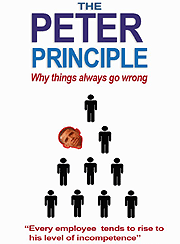 by Ronald E. Riggio, Ph.D. –
by Ronald E. Riggio, Ph.D. –
How and why do incompetent people rise to the top?
Why are there so many incompetent leaders? Is your boss less than competent? How about that department head in accounting or HR that doesn’t know his/her job? How in the world do incompetent people rise to the top in many organizations? Here are the reasons:
We Don’t Do a Good Job of Selecting Leaders. We simply don’t invest the time or resources needed to select the best people for jobs. Time and time again, we take hiring shortcuts. We interview in a haphazard way, and select the person who appears best in the interview. The problem is that often the best performer in the interview is one of the least competent workers (they’re so good in the interview because they get so much practice, because they are often fired!). [Read more…]

 by Alyson Shontell –
by Alyson Shontell – by Thomas Lockwood –
by Thomas Lockwood – by Marla Tabaka –
by Marla Tabaka – by Ryan Ellis –
by Ryan Ellis – by Amy Gallo –
by Amy Gallo –